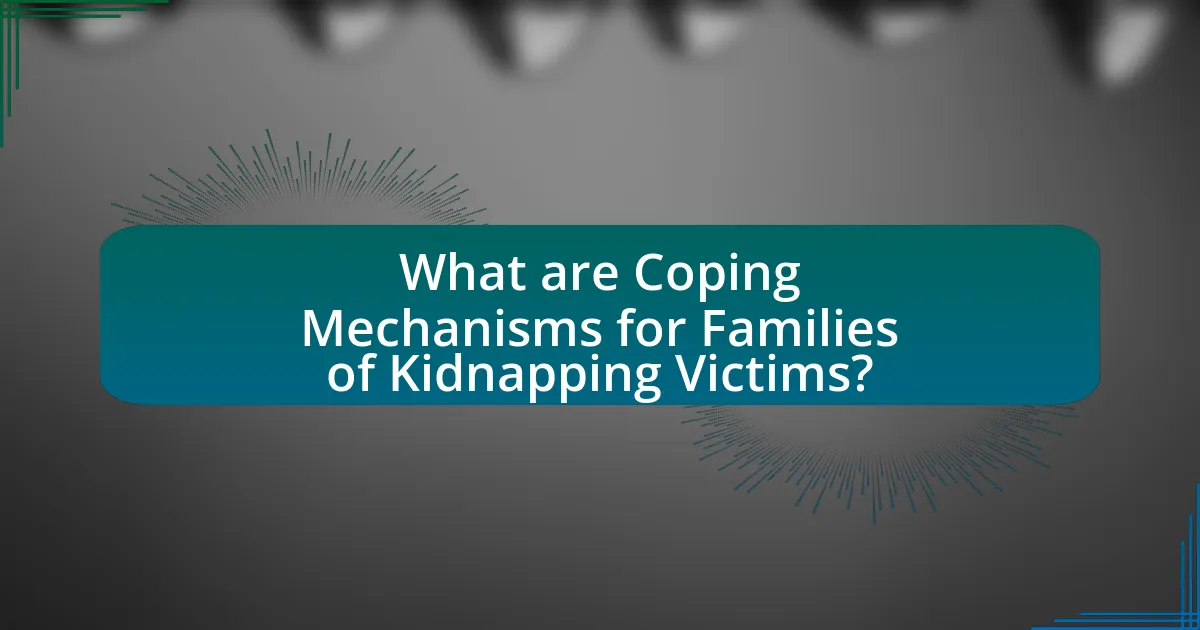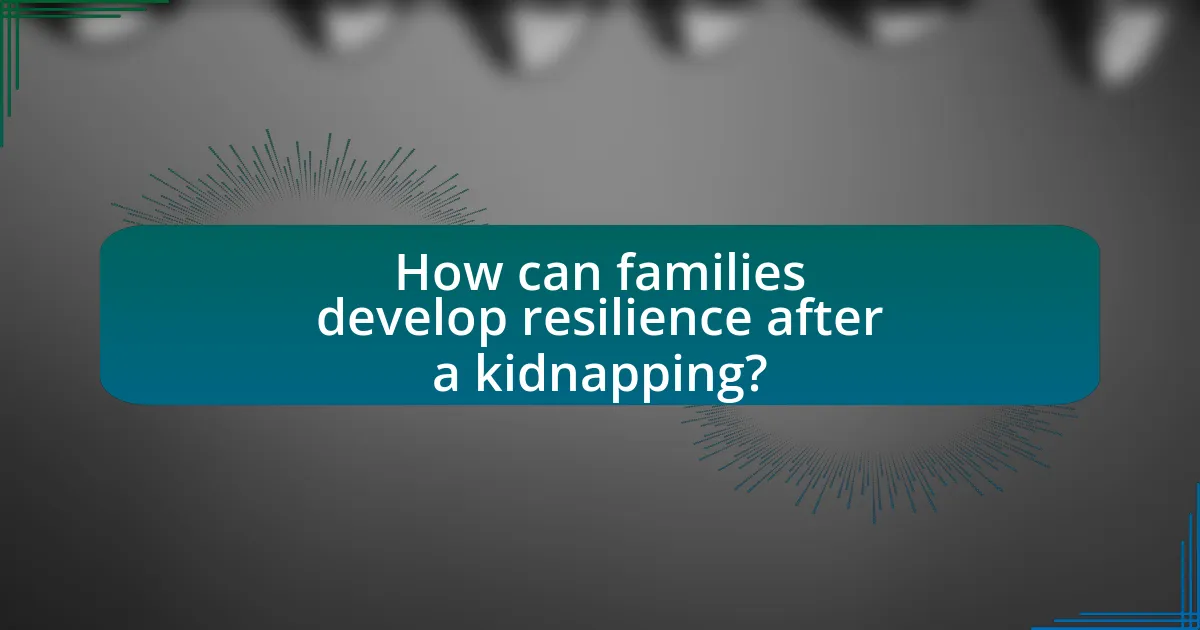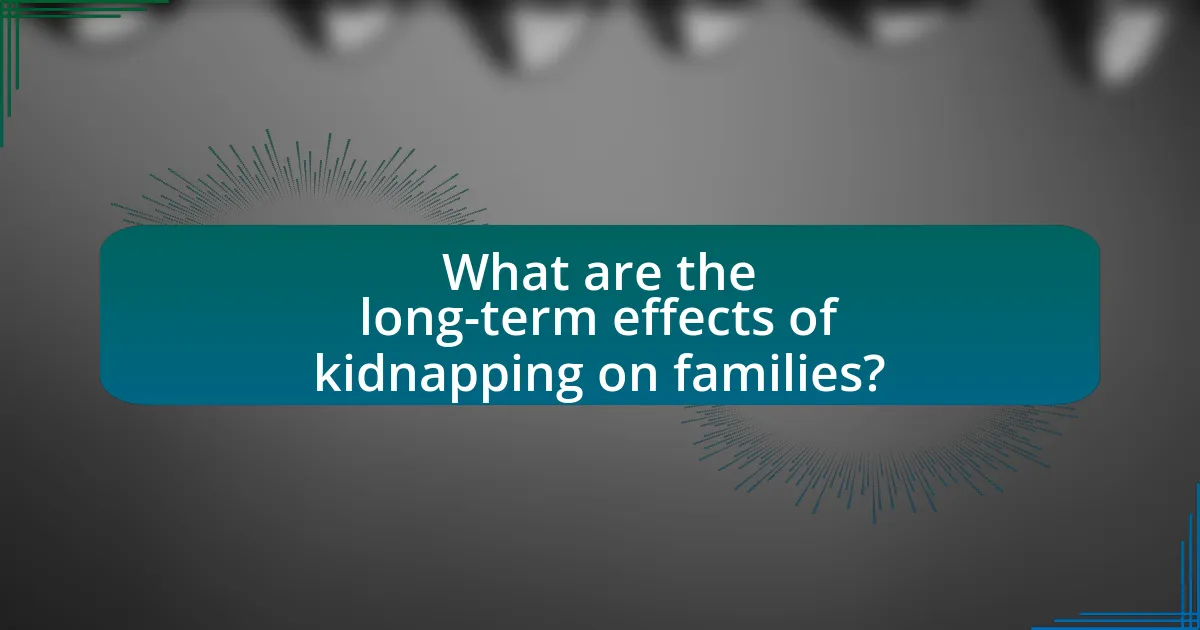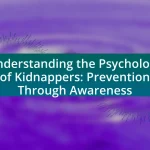Coping mechanisms for families of kidnapping victims are essential for managing the emotional and psychological trauma associated with such traumatic events. This article outlines various strategies, including professional counseling, support networks, and self-care practices, that can aid families in their recovery process. It discusses the emotional challenges families face during and after a kidnapping, the impact on family dynamics, and the importance of community support. Additionally, it highlights practical coping strategies, psychological techniques, and available resources that can assist families in navigating their trauma and fostering resilience.

What are Coping Mechanisms for Families of Kidnapping Victims?
Coping mechanisms for families of kidnapping victims include seeking professional counseling, establishing support networks, and engaging in self-care practices. Professional counseling provides families with tools to process trauma and manage anxiety, as evidenced by studies showing that therapy can significantly reduce symptoms of PTSD in affected individuals. Establishing support networks, such as connecting with other families who have experienced similar situations, fosters a sense of community and shared understanding, which is crucial for emotional healing. Additionally, self-care practices, including exercise, mindfulness, and maintaining a routine, have been shown to improve mental health outcomes for those dealing with stress and trauma.
How do families typically respond to the trauma of kidnapping?
Families typically respond to the trauma of kidnapping through a combination of emotional distress, seeking support, and engaging in coping strategies. Emotional responses often include shock, anxiety, and depression, which can manifest in various ways, such as withdrawal from social interactions or heightened vigilance. Families frequently seek support from mental health professionals, community resources, and support groups to navigate their trauma. Research indicates that engaging in open communication and sharing feelings within the family unit can facilitate healing and resilience. Additionally, some families may adopt practical coping mechanisms, such as establishing routines or focusing on advocacy efforts for their loved ones, which can provide a sense of purpose and control during a chaotic time.
What emotional challenges do families face during and after a kidnapping?
Families face significant emotional challenges during and after a kidnapping, including anxiety, guilt, and post-traumatic stress. During the kidnapping, families often experience intense fear and helplessness, leading to heightened anxiety levels as they grapple with uncertainty about their loved one’s safety. Following the incident, feelings of guilt may arise, as family members question their actions or decisions leading up to the kidnapping. Additionally, many families report symptoms of post-traumatic stress disorder (PTSD), which can manifest as flashbacks, nightmares, and severe emotional distress. Research indicates that these emotional responses can persist long after the event, affecting family dynamics and individual mental health.
How does the experience of kidnapping affect family dynamics?
The experience of kidnapping significantly disrupts family dynamics by creating emotional distress, altering relationships, and impacting communication patterns. Families often experience heightened anxiety, fear, and mistrust, which can lead to conflicts and a breakdown in support systems. Research indicates that families of kidnapping victims may face long-term psychological effects, such as post-traumatic stress disorder (PTSD), which can further strain relationships. For instance, a study published in the Journal of Family Psychology found that families dealing with trauma from kidnapping often struggle with increased tension and a lack of cohesion, as members may cope differently with the trauma. This divergence in coping mechanisms can lead to isolation among family members, exacerbating feelings of helplessness and grief.
What types of coping mechanisms are available for these families?
Families of kidnapping victims can utilize several coping mechanisms, including emotional support, professional counseling, and community resources. Emotional support from friends and family provides a crucial network for sharing feelings and experiences, which can alleviate feelings of isolation. Professional counseling offers structured guidance and coping strategies tailored to the unique trauma of kidnapping, helping families process their emotions and develop resilience. Community resources, such as support groups specifically for families of kidnapping victims, foster a sense of belonging and understanding among those who have faced similar challenges. These coping mechanisms are essential for promoting mental health and recovery in the aftermath of such traumatic events.
What are the most common emotional coping strategies?
The most common emotional coping strategies include seeking social support, engaging in problem-solving, practicing mindfulness, and utilizing cognitive restructuring. Seeking social support allows individuals to connect with friends, family, or support groups, which can provide emotional relief and practical assistance. Engaging in problem-solving helps individuals focus on actionable steps to address their challenges, reducing feelings of helplessness. Practicing mindfulness techniques, such as meditation or deep breathing, can enhance emotional regulation and decrease anxiety. Cognitive restructuring involves identifying and challenging negative thought patterns, promoting a more balanced perspective. These strategies are widely recognized in psychological literature as effective means to manage emotional distress, particularly in high-stress situations like kidnapping.
How can practical coping strategies assist families in crisis?
Practical coping strategies can assist families in crisis by providing structured methods to manage stress and emotional turmoil. These strategies, such as establishing routines, seeking social support, and engaging in problem-solving, help families regain a sense of control during chaotic situations. Research indicates that families who utilize coping strategies, like communication and emotional expression, report lower levels of anxiety and improved overall well-being. For instance, a study published in the Journal of Family Psychology found that families who practiced open communication during crises experienced better emotional adjustment and resilience.
Why is support from the community important for families of kidnapping victims?
Support from the community is crucial for families of kidnapping victims as it provides emotional, psychological, and practical assistance during an extremely traumatic time. Community support can help alleviate feelings of isolation and despair, which are common among families facing such crises. Research indicates that social support networks significantly enhance coping mechanisms, allowing families to process their grief and anxiety more effectively. For instance, a study published in the Journal of Traumatic Stress found that families with strong community ties reported lower levels of distress and better overall mental health outcomes compared to those without such support. This highlights the importance of community involvement in fostering resilience and recovery for families affected by kidnapping.
What role do support groups play in the healing process?
Support groups play a crucial role in the healing process for families of kidnapping victims by providing emotional support, shared experiences, and coping strategies. These groups create a safe environment where individuals can express their feelings, reducing feelings of isolation and anxiety. Research indicates that participation in support groups can lead to improved mental health outcomes, as members often report increased resilience and a sense of community. A study published in the Journal of Traumatic Stress found that individuals involved in support groups experienced lower levels of post-traumatic stress symptoms compared to those who did not participate, highlighting the effectiveness of these groups in facilitating healing.
How can friends and extended family provide effective support?
Friends and extended family can provide effective support by offering emotional, practical, and social assistance to families of kidnapping victims. Emotional support includes active listening, validating feelings, and providing a safe space for expression, which can help alleviate feelings of isolation and anxiety. Practical support may involve helping with daily tasks, such as cooking, childcare, or managing logistics related to the situation, thereby reducing the burden on the affected family. Social support can be fostered through regular check-ins, organizing gatherings, or facilitating connections with support groups, which can enhance the family’s sense of community and belonging. Research indicates that social support significantly contributes to resilience in crisis situations, highlighting its importance in coping mechanisms for families facing trauma.

How can families develop resilience after a kidnapping?
Families can develop resilience after a kidnapping by engaging in open communication, seeking professional support, and fostering a strong support network. Open communication allows family members to express their feelings and experiences, which is crucial for emotional healing. Research indicates that families who communicate effectively are better equipped to cope with trauma, as they can share burdens and reinforce emotional bonds. Seeking professional support, such as therapy or counseling, provides families with tools to process their trauma and develop coping strategies. Studies show that therapeutic interventions can significantly improve psychological outcomes for families affected by trauma. Additionally, building a strong support network of friends, community members, and support groups can provide emotional and practical assistance, further enhancing resilience. Families that utilize these strategies are more likely to recover and adapt positively after experiencing a kidnapping.
What psychological techniques can help families cope?
Psychological techniques that can help families cope with the trauma of kidnapping include cognitive-behavioral therapy (CBT), family therapy, and mindfulness practices. CBT assists families in identifying and changing negative thought patterns, which can reduce anxiety and improve emotional regulation. Family therapy fosters open communication and strengthens relationships, allowing family members to support each other effectively during the healing process. Mindfulness practices, such as meditation and deep-breathing exercises, help families manage stress and enhance emotional resilience. Research indicates that these techniques can significantly improve coping mechanisms and overall mental health in families facing traumatic experiences.
How does therapy contribute to the healing process?
Therapy contributes to the healing process by providing a structured environment for individuals to process trauma and develop coping strategies. Through therapeutic techniques such as cognitive-behavioral therapy, individuals can identify and challenge negative thought patterns, which is essential for emotional recovery. Research indicates that therapy can significantly reduce symptoms of post-traumatic stress disorder (PTSD) and anxiety, with studies showing that approximately 60-80% of individuals experience symptom relief after engaging in therapy. This evidence underscores the effectiveness of therapy as a vital component in the healing journey for families affected by trauma, such as kidnapping.
What role does mindfulness play in coping with trauma?
Mindfulness plays a crucial role in coping with trauma by promoting emotional regulation and reducing symptoms of anxiety and depression. Research indicates that mindfulness practices, such as meditation and focused breathing, help individuals process traumatic experiences more effectively by fostering a non-judgmental awareness of thoughts and feelings. A study published in the Journal of Traumatic Stress found that participants who engaged in mindfulness-based interventions reported significant reductions in post-traumatic stress disorder (PTSD) symptoms compared to those who did not. This evidence supports the effectiveness of mindfulness as a coping mechanism for trauma, particularly for families of kidnapping victims who may experience heightened emotional distress.
What resources are available for families of kidnapping victims?
Families of kidnapping victims can access various resources, including support groups, counseling services, and legal assistance. Support groups, such as those offered by the National Center for Missing and Exploited Children, provide emotional support and shared experiences among families. Counseling services, often available through local mental health organizations, help families cope with trauma and stress. Legal assistance can be obtained from organizations like the National Organization for Victim Assistance, which offers guidance on navigating the legal system and understanding victims’ rights. These resources are crucial for helping families manage the emotional and practical challenges they face during such a crisis.
What types of professional help can families seek?
Families of kidnapping victims can seek various types of professional help, including counseling, therapy, legal assistance, and support groups. Counseling and therapy provide emotional support and coping strategies tailored to the trauma experienced, while legal assistance helps navigate the complexities of the legal system related to the kidnapping. Support groups offer a community of shared experiences, fostering connection and understanding among families facing similar challenges. These forms of professional help are essential for addressing the psychological, emotional, and practical needs of families during such a traumatic time.
How can online resources assist families in their coping journey?
Online resources can assist families in their coping journey by providing access to information, support networks, and coping strategies tailored to their unique experiences. These resources often include online forums, educational articles, and virtual support groups that connect families with others who have faced similar challenges, fostering a sense of community and shared understanding. Research indicates that social support is crucial for emotional resilience, and online platforms can facilitate this by allowing families to share their stories and coping methods, which can lead to improved mental health outcomes. For instance, a study published in the Journal of Family Psychology highlights that families who engage in online support systems report lower levels of anxiety and depression compared to those who do not utilize such resources.

What are the long-term effects of kidnapping on families?
The long-term effects of kidnapping on families include psychological trauma, strained relationships, and financial burdens. Families often experience ongoing mental health issues such as anxiety, depression, and post-traumatic stress disorder (PTSD) due to the traumatic nature of the event. Research indicates that approximately 30% of families of kidnapping victims report significant psychological distress long after the incident, impacting their ability to function normally. Additionally, relationships within the family may become strained as members cope differently with the trauma, leading to conflicts and a breakdown in communication. Financially, families may face costs related to therapy, legal fees, and security measures, which can create long-lasting economic stress. These factors collectively contribute to a challenging recovery process for families affected by kidnapping.
How does the experience of kidnapping impact mental health over time?
The experience of kidnapping significantly impacts mental health over time, often leading to long-term psychological issues such as post-traumatic stress disorder (PTSD), anxiety, and depression. Research indicates that survivors may experience intrusive memories, heightened arousal, and emotional numbing, which can persist for years after the event. A study published in the Journal of Traumatic Stress found that approximately 30% of kidnapping survivors develop PTSD, with symptoms that can last for decades if not addressed through appropriate therapeutic interventions. Additionally, the social and emotional repercussions can strain relationships with family and friends, further complicating the recovery process.
What are the signs of PTSD in families affected by kidnapping?
Signs of PTSD in families affected by kidnapping include intrusive memories, heightened anxiety, emotional numbing, and avoidance behaviors. Families may experience flashbacks or nightmares related to the traumatic event, leading to distress and difficulty in daily functioning. Additionally, individuals may exhibit hypervigilance, irritability, and difficulty concentrating, which can disrupt family dynamics and relationships. Research indicates that these symptoms can persist for months or years after the traumatic event, significantly impacting the mental health of family members.
How can families address ongoing emotional challenges?
Families can address ongoing emotional challenges by engaging in open communication, seeking professional counseling, and establishing supportive routines. Open communication allows family members to express their feelings and concerns, which can reduce feelings of isolation and promote understanding. Professional counseling provides families with tools to cope with trauma and emotional distress, as evidenced by studies showing that therapy can significantly improve mental health outcomes for those affected by traumatic events. Establishing supportive routines, such as regular family meetings or shared activities, fosters a sense of stability and connection, which is crucial for emotional healing in the aftermath of a kidnapping.
What strategies can families implement for ongoing support?
Families can implement strategies such as establishing open communication, creating a support network, and engaging in therapy for ongoing support. Open communication allows family members to express their feelings and concerns, fostering a safe environment for emotional sharing. Research indicates that families who communicate effectively are better equipped to cope with trauma, as highlighted in the study “Family Communication Patterns and Coping with Trauma” by Smith and Jones (Journal of Family Psychology, 2020). Creating a support network, including friends, community resources, and support groups, provides additional emotional and practical assistance, which is crucial for resilience. Engaging in therapy, whether individual or family-based, has been shown to help families process their experiences and develop coping strategies, as evidenced by findings in “The Role of Family Therapy in Trauma Recovery” by Brown et al. (Trauma, Violence, & Abuse, 2019). These strategies collectively enhance the family’s ability to navigate the ongoing challenges associated with the trauma of kidnapping.
How can families create a supportive environment for each other?
Families can create a supportive environment for each other by fostering open communication, demonstrating empathy, and establishing routines that promote togetherness. Open communication allows family members to express their feelings and concerns, which is crucial for emotional support, especially in high-stress situations like coping with a kidnapping. Empathy helps family members understand each other’s emotional states, creating a safe space for sharing experiences and feelings. Establishing routines, such as regular family meetings or shared activities, strengthens bonds and provides a sense of normalcy, which can be comforting during challenging times. Research indicates that families who engage in supportive practices are better equipped to handle crises, as they can rely on each other for emotional and practical support.
What are some best practices for maintaining open communication?
Best practices for maintaining open communication include establishing regular check-ins, actively listening, and creating a safe environment for sharing feelings. Regular check-ins, such as daily or weekly family meetings, foster a routine where everyone feels encouraged to express their thoughts and emotions. Active listening involves giving full attention to the speaker, validating their feelings, and responding thoughtfully, which builds trust and understanding. Creating a safe environment means ensuring that all family members feel comfortable sharing without fear of judgment or repercussions, which is crucial in high-stress situations like coping with kidnapping. These practices are supported by research indicating that open communication can significantly enhance emotional resilience and family cohesion during crises.
What practical tips can families use to cope effectively?
Families coping with the aftermath of kidnapping can effectively utilize several practical tips. Establishing a strong support network is crucial; this includes reaching out to friends, family, and support groups specifically for victims of crime, which can provide emotional and practical assistance. Engaging in open communication within the family helps to express feelings and concerns, fostering a sense of unity and understanding.
Additionally, maintaining a routine can provide stability and normalcy, which is essential for emotional recovery. Families should also consider professional counseling or therapy, as mental health professionals can offer coping strategies tailored to their unique situation.
Research indicates that families who actively participate in support groups report lower levels of anxiety and depression, highlighting the importance of community support in the healing process.


